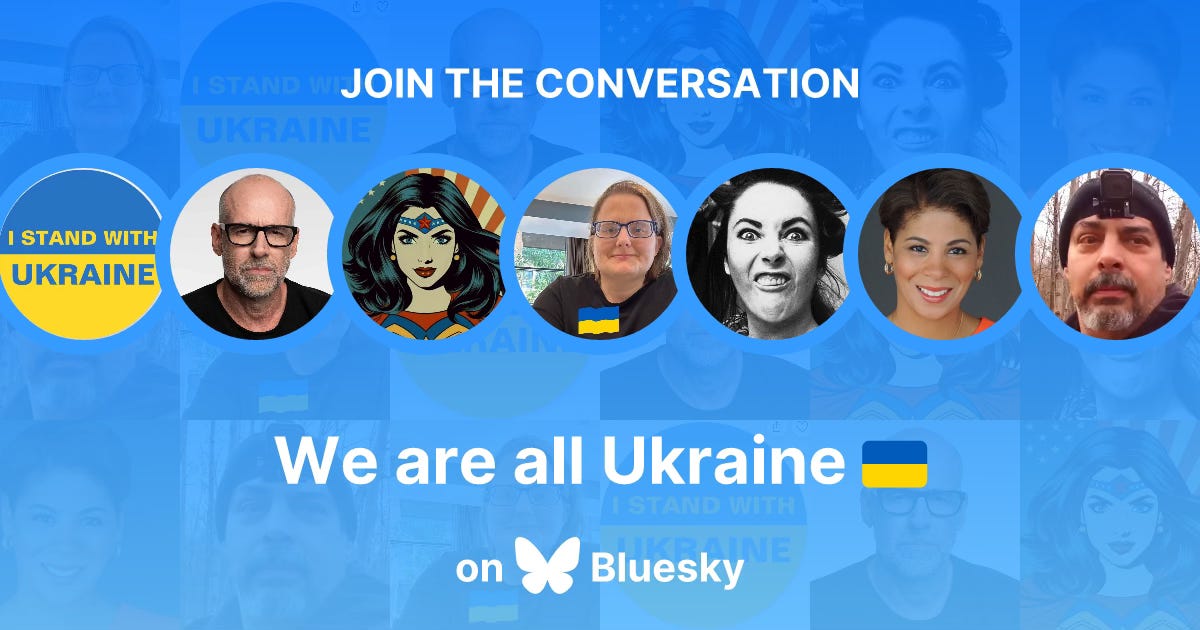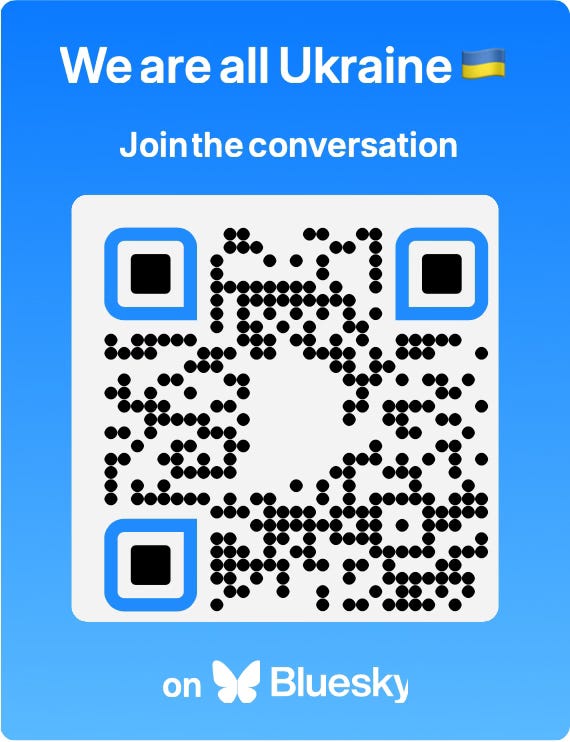Identity, dignity and freedom
Ukraine's fight is our fight, a struggle to define fundamental meanings
On February 24, 2022, Russian troops invaded Ukraine. This was eight years after the Russian Federation took over the Crimean Peninsula in its diabolical mission to reconstruct the USSR. For the former KGB officer Vladimir Putin, the takeover of Ukraine is about so much more than just grabbing up rare earth minerals. It is fundamentally about erasing Ukrainian culture and restructuring its place in the world order as nothing more than a Russian—or rather, Soviet—vassal. Putin considers the whole notion of Ukraine as a sovereign state to be a lie. He does not want the Ukrainian people to have their own identity. If you want to erase a people’s identity, you attack their cultural institutions, and that is exactly what Putin’s military set out to do. In December 2022, Guardian Observer journalist Stephen Marche wrote an excellent piece about the “warrior librarians” and archivists of Ukraine who, immediately after the invasion, set to work, with international colleagues and volunteers, securing, preserving, and digitizing everything they could while the bombs came down on museums, galleries, and repositories of books and artifacts. Far from undermining the Ukrainian identity, Putin’s war has expedited and intensified the efforts of those most passionate about it. Marche wrote that “the war against Ukrainian identity has forced Ukrainians deeper into their identity” and that “[t]here has never been a war in which poetry has mattered more.” Historically in Ukraine, there have been two competing visions of the national culture—on one side, the Russophile work To The Slanderers of Russia, by Alexander Pushkin,1 calling for unity among Eastern Europe under the protection of Mother Russia; and on the other side, the poet Shevchenko. Shevchenko believed in the Ukrainian identity wholly independent from Mother Russia. The 19th century and early 20th century were times of great Ukrainian revivalism in the arts, but the Russian Revolution of 1917 ushered in decades of oppression toward anything critical of the Kremlin, a situation that did not really begin to lift until Ukraine attained independence in 1991.2 We are now living through the latest major revival of Ukrainian pride.
Institutions around the world stood up to help Ukrainian academics, researchers, and students not only find refuge but continue the important work of protecting and advancing the Ukrainian spirit. One of these was Philo Monaco, a philosophical institution based in, you might have guessed, Monaco. In solidarity with the invaded sovereign nation, Philo Monaco changed its social media logo from Monaco’s flag to the Ukrainian blue and yellow. Shortly after the invasion, Charlotte Casiraghi, one of the founders of Philo Monaco, addressed3 what she called an emergency assembly—in English, “Philosopher Now: By the Side of Ukraine”—to raise funds for French institutions to bring Ukrainian researchers and students to France, to participate in the philosophical meetings in Monaco, and to give financial aid to those academics who remained to do their work in Ukraine. Casiraghi, the niece of Prince Albert II of Monaco, also used the opportunity to say that Ukrainians would always be welcome in her country. She highlighted the fact that this assembly was held in the Principality’s Oceanographic Museum, founded by her ancestor, the first Prince Albert, who was a great scientist, oceanographer, navigator, and explorer. The first Albert was also a great diplomat, she said, who worked for international cooperation and peace. In 1903, the “Navigator Prince” founded the International Institute of Peace in Monaco. Not only was he a man of science, she said, but he laid the groundwork for Monaco as a place of “dialogue and exchanges between cultures and nations….” In that shadow, Casiraghi made her appeal for donations to the French institutional efforts to join hands with their Ukrainian counterparts, and she furthermore declared her own solidarity behind the cause. “We,” she said, “are in the same boat [with the Ukrainians, because] the war begun by Vladimir Putin is not only a war against Ukraine but a war against democracy which [impacts] us all and undermines the principles on which democracy was founded.” She said that “we are probably witnessing a perilous historical turning point” which calls on us who believe in “a certain idea of dignity and freedom.”4
As of February 2025, there were 249 “buildings of historical and/or artistic interest”5 damaged in the Russo-Ukraine war. One of the most devastating hits was the 2022 razing of the city of Mariupol, including the bombing of the city’s playhouse theatre, which killed the 600 people in the bomb shelter beneath it. The Russians declared victory in this battle and took over the city. Taking their cruelty to new heights, they restored the theatre for the self-serving purpose of staging a Russian propaganda variety show.6
I think the best expression of why this is all so relevant to what is happening in American (and let’s face it, global) politics right now is a comment on a YouTube video7 from a Ukrainian. A screenshot of the comment was then posted on Bluesky.
It reminds us of the recent history of Russian aggression into Ukraine, starting with Russia’s interference in their 2010 presidential election. Ukrainians fought back and are still fighting back. They are showing Americans how the defense of democracy is done. I don’t know if Americans are quite courageous enough to stage our own Revolution of Dignity. I’ve long feared that we are too spoiled, too pampered, too much like what Aldous Huxley prophesied in Brave New World. In spite of that, I maintain some hope that my fellow Americans will prove me wrong. Until now, the U.S. president has been hailed as “the leader of the free world.” For all his lip service about “free speech,” Donald Trump shows himself increasingly to be the antagonist of free-world ideology. I think Americans have much to learn from Ukraine, their history, literature, and their current leader, Volodymyr Zelenskyy. That’s why Ukraine is to be the theme of the literary magazine I will publish in the Spring of 2026. Submissions are now open to all writers. Learn more: https://heavycrownpress.wordpress.com. Also, please do join our community on Bluesky. Remember always, our greatest power comes when we recognize that we are not alone.
https://dvpp.uvic.ca/poems/blackwoods/1845/pom_11026_to_the_slanderers_of_russia.html.
https://www.britannica.com/art/Ukrainian-literature.
In French, but I will translate for our purposes here.
“Philosopher maintenant - Aux côtés de l’Ukraine.” Philo Monaco. YouTube. 28 March 2022. https://web.archive.org/web/20220327210525/https://philomonaco.com/ukraine/.
https://www.unesco.org/en/articles/damaged-cultural-sites-ukraine-verified-unesco.
https://ua.boell.org/en/2022/07/07/two-russias-variety-turn-mariupol-drama-theatre.
“US senator asks if Donald Trump is a Russian asset after bust-up with Zelenskyy | Janta Ka Reporter.” Janta Ka Reporter. March 5, 2025.



